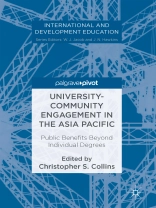This edited volume provides a framework for understanding academic public good and offers case studies and perspectives as in depth examples of the ways in which colleges and universities engage with the community to produce social benefits. Focusing on the Asia Pacific region, the authors discuss examples of engagement that produce consciousness, partnerships, and services that are broadly available to the public and enhance the progress of society. The authors argue that, unlike an individual degree, these are public benefits that should be focused upon and featured more readily so that the breadth of university benefits come to be better understood.
विषयसूची
Chapter 1. Defining Academic Public Good.- Chapter 2. Post-Secondary Public Health Education: Its Meaning and Value beyond the Walls of the Academic Institution.- Chapter 3. Continued Learning in an Aging Society: A University-Community Collaborative Educational Intervention in Taiwan.- Chapter 4. Digital Heritage as a Rhetorical Tool for Community and Cultural Preservation.- Chapter 5. Creative Tourism and University-Community Engagement: The Case of Trat Province, Thailand.- Chapter 6. The Impact of University-Community Projects: A Case Study at Vietnam National University.- Chapter 7. The Challenges and Benefits of Transnational Higher Education: A Case Study of Sino-foreign Cooperation University in China.- Chapter 8. University-Community Connections and the Thai Concept of Sufficiency: The Case of 9 Boworn.
लेखक के बारे में
Christopher S. Collins is Assistant Professor of Higher Education at Azusa Pacific University, USA, and Associate Director of the Asia Pacific Higher Education Research Partnership at the East-West Center in Honolulu, Hawaii. His research focuses on the function of higher education in society and its role in social and economic progress.












